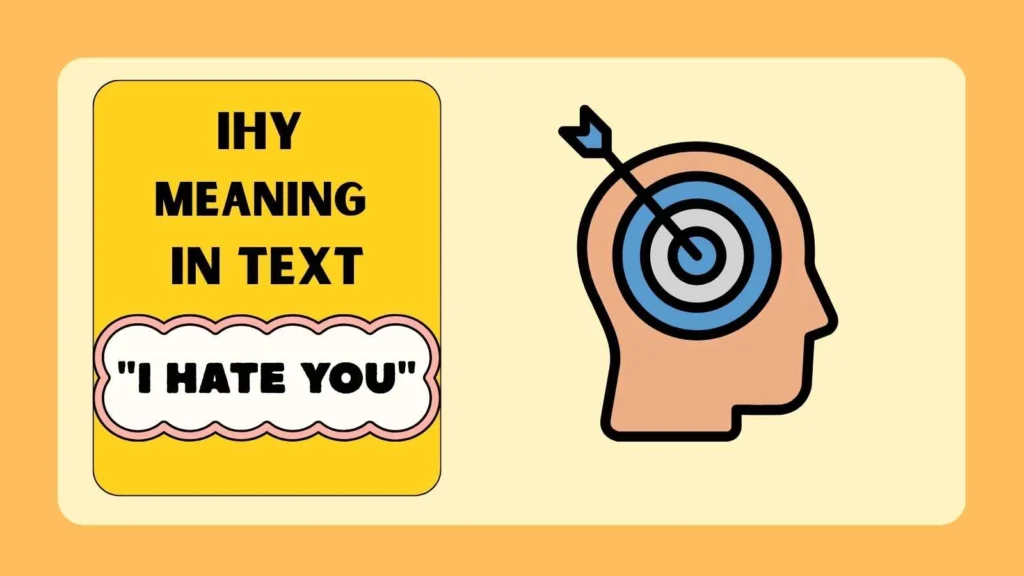Last updated on October 1st, 2025 at 09:26 am
In the fast-paced world of texting and social media, acronyms have become a shorthand language for millions of users worldwide.
One acronym that often pops up in conversations is ihy. Many people stumble upon it in chats, online forums, or dating apps and wonder what it actually means. Understanding ihy meaning in text can save you from confusion, miscommunication, or even unintended offense.
While some acronyms are universal, others have subtle nuances depending on context, platform, or culture.
Whether you are texting friends, replying to social media messages, or navigating online dating, knowing this acronym’s meaning is helpful.
In this guide, we break down everything about ihy, from its origin to usage tips, common misconceptions, and how it compares to similar texting abbreviations.
Definition & Meaning
The acronym ihy typically stands for “I hate you” in text language. It is often used informally in casual messaging or joking contexts among friends.
However, the meaning can vary depending on tone, capitalization, or the relationship between the sender and recipient.
While it may sound harsh literally, in some cases, it’s employed humorously or sarcastically.
Understanding the intention behind ihy is crucial to avoid misunderstandings.
Background & History
Abbreviations like ihy evolved from early internet slang, chatrooms, and SMS texting, where character limits encouraged concise communication.
Acronyms became a cultural phenomenon in the 2000s with the rise of instant messaging platforms like AOL Instant Messenger, MSN, and later, social media apps like Twitter, Snapchat, and TikTok.
Over time, ihy found its place in meme culture and casual texting, often used to exaggerate playful frustration rather than actual hate.
Usage in Various Contexts
IHY can appear in multiple situations:
- Friendly teasing: Among close friends, someone might text ihy after a prank or joke.
- Romantic banter: Couples sometimes use it jokingly during playful disagreements.
- Serious anger: In rare cases, it may genuinely express dislike or frustration.
- Memes and online posts: It is often used humorously in viral content or GIFs.
The key to understanding ihy meaning in text is reading the tone and context rather than taking it literally.
Common Misconceptions & Clarifications
Many people assume ihy is always negative. In reality, it depends on context. Among friends or partners, it can express affection disguised as sarcasm.
Misinterpreting it in professional or formal contexts may cause awkwardness. Therefore, clarity is vital when encountering this abbreviation in unfamiliar conversations.
Similar Terms & Alternatives
Some abbreviations and acronyms similar to ihy include:
- ILY – “I love you”
- IDK – “I don’t know”
- SMH – “Shaking my head”
- WYD – “What are you doing?”
Unlike ILY, which conveys positive emotion, ihy conveys frustration or teasing. Using alternatives carefully can help maintain the intended tone.
How to Respond to This Term
Responses depend on context:
- Friendly tone: Reply with humor or a playful comeback.
- Romantic tone: Use emojis or witty banter to keep the conversation light.
- Serious tone: Clarify feelings to avoid misunderstandings.
Always gauge the sender’s intent before responding to ihy in texts.
Regional or Cultural Differences
The interpretation of ihy may vary depending on location or cultural background.
In English-speaking countries, it’s generally understood as “I hate you,” but in non-native English contexts, users might misinterpret it or not recognize it at all.
Cultural sensitivity and context awareness are key to avoiding unintended offense.
Comparison with Similar Terms
While ihy expresses frustration or playful annoyance, ILY conveys love, and IDK communicates uncertainty.
Comparing these acronyms highlights how tone and context determine whether texting abbreviations are friendly, sarcastic, or serious.
Understanding this distinction helps prevent miscommunication.
Usage in Online Communities & Dating Apps
In online communities, forums, and dating apps, ihy is often used jokingly or sarcastically.
Users leverage it to exaggerate emotions, add humor, or signal playful teasing.
Reading the conversation carefully is important, especially in dating apps where tone can be easily misunderstood.
Hidden or Offensive Meanings
While usually playful, ihy can sometimes be offensive if sent seriously.
Unlike neutral acronyms, it conveys strong emotion, so it’s important to consider your relationship with the recipient and the conversation context.
Misuse in professional or casual settings may be misinterpreted as rude or aggressive.
Suitability for Professional Communication
IHY is generally not suitable for professional communication.
It can be misinterpreted and create awkward situations.
If you need to express frustration in a workplace chat, it’s better to use polite language rather than texting acronyms like ihy.
FAQs
What does ihy stand for in texting?
It usually means “I hate you,” often used jokingly.
Is ihy always negative?
No, it can be playful or sarcastic depending on context.
Can I use ihy with strangers?
It’s risky; strangers may misinterpret the tone.
Is ihy used on dating apps?
Yes, often humorously or teasingly.
How should I respond to ihy?
Gauge the tone first, then respond playfully or clarify.
Is ihy appropriate for work messages?
No, it’s not suitable for professional communication.
Conclusion
Understanding ihy meaning in text is essential in today’s digital communication world.
While it literally translates to “I hate you,” its usage is often playful, sarcastic, or humorous, especially among friends, couples, or online communities.
Context, tone, and relationship with the sender are key factors in interpreting this acronym correctly.
Being aware of cultural differences, potential misunderstandings, and professional boundaries ensures you use texting abbreviations like ihy responsibly and effectively.
By learning how to respond and recognizing similar terms, you can navigate modern digital conversations confidently.
